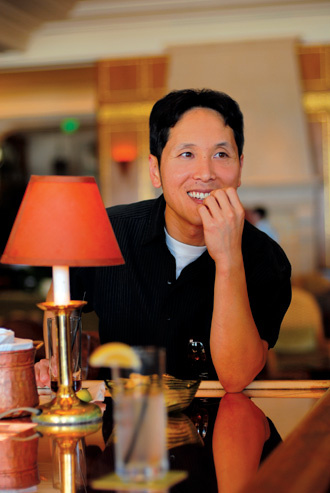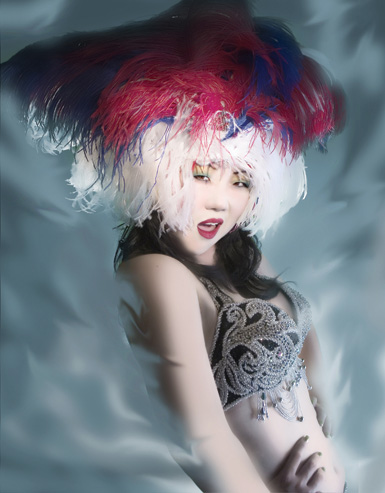By Michelle Woo
Photographs by Eric Sueyoshi
There’s a scene in the film “The Trouble With Romance” where actor Roger Fan gets buck naked, sits on the toilet and does his business on a photograph of his ex-girlfriend while sobbing over his failed romance.
It’s outrageous, it’s disgusting and audiences loved it.
Sitting with a glass of Diet Coke at the bar inside the Victorian-style Casa Del Mar hotel in Santa Monica, Calif., director Gene Rhee animatedly dishes the back story.
“It happened to a friend of a co-writer,” Rhee explains. “He was so fed up when his high school crush didn’t pay any attention to him that he tore up her picture and crapped on it. We thought, hey, that’s really funny.”
Turns out that many of the vignettes in “Trouble,” Rhee’s debut feature-length film, were spun from real-life events and his own musings on relationships. (He’d just broken up with his girlfriend when he co-wrote the script.) The racy comedy explores love and all its trials through a quartet of mini-stories, from a woman who hallucinates about an ex-lover while getting frisky with a new one to a young man who has a jittery first encounter with a call girl. The film, which boasts a recognizable cast that includes David Eigenberg (“Sex and the City”), Kip Pardue (“Remember the Titans”) and Jennifer Siebel (“Something’s Gotta Give”), has recently been screened at festivals throughout Los Angeles and San Francisco.
The low-budget project emerged partly out of restlessness. For the last few years, he has been attached to direct the thriller “Forsaken Seoul” for Madonna’s Maverick Films, but it’s been mired in what he calls “development hell.” In the meantime, Rhee was antsy to get back into the director’s chair.
“I was frustrated,” he says. “I just wanted to shoot something.”
The New Jersey-born, Southern California-raised go-getter has had that same hunger ever since his high school days, when he worked as a production assistant for the ‘80s sitcom “Perfect Strangers.” Although he never considered a career in film while growing up (“It was the Korean conservative in me,” he says), there was something about watching so many different parts come together that excited him.
“When everyone was on the set, it was like being a kid on the playground,” he remembers. “I thought, ‘I can’t believe people are getting paid for this.’”
Rhee studied business at the University of Pennsylvania and, after college, started working at an L.A.advertising agency that had big name clients such as Nike. He enjoyed the creative environment, but knew it wasn’t his passion.
“I had this mid-life crisis at the age of 24,” he says. “I wondered, ‘Am I just going to sell a shoe for the rest of my life?’ One day, I was talking with the creative director at my company about movies and I guess I must have been so excited and enthusiastic because he asked me, ‘Why don’t you go into film?’ And I was like, ‘No, it’s too risky.’ Then he asked me, ‘Are you married? Do you have kids? What’s the risk?’”
That afternoon, he drove himself to the University of Southern California campus to pick up an application for film school. He graduated in 1995.
He got his first break when his comedic short “The Quest For Length,” starring Roger Fan, became a hit at the 2002 Sundance Film Festival. The mockumentary about a man who wants a penis enlargement relied solely on talent, not resources. The film cost about $200 to make.
One of Rhee’s gifts, says Fan, is making actors feel at ease. He says he jumped at the chance to work with Rhee again on “Trouble.”
“The funny thing about directors is that most are either good technically or good with people,” Fan says. “You rarely find a combination of the two. Gene knows how to talk about a scene from an actor’s point of view. He explores it with you. When you’re naked on screen, you have to feel safe. His demeanor creates a calm set.”
Rhee says he never wanted to be referred to as an “Asian American filmmaker.” He doesn’t want his viewers to read too much into the social commentary of his scripts. His goal is simply to make good films.
“There weren’t a ton of Asian Americans in film school, but those who I talked to would all say things like, ‘I want to make a film about the Asian American experience.’ I would say, ‘I want to make “Raidars of the Lost Ark.” I want to make “Star Wars.”
For Rhee, who lives in Marina del Rey, Calif., each day is like doing a one-man show. He still hopes to get “Forsaken Seoul” off the ground, and he’s set to do a Western for the Korean Film Council (KOFIC). When making films, he says he doesn’t want to stick to a single genre.
“I wear so many hats,” Rhee says. “There’s the sales rep hat — and that’s all business. I’m meeting with people to sell my scripts. There’s the writing hat. That’s when I’m a pure artist. And there’s the producer and director’s hat. I prefer the creative element. It’s when I immerse myself in this imaginary world.”









